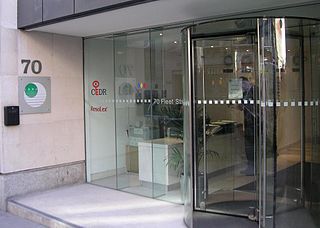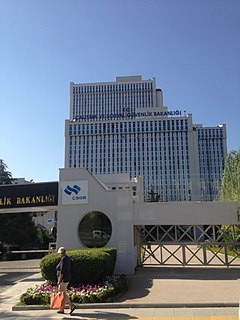
The politics of Turkey takes place in a framework of a presidential republic, whereby the President of Turkey is the head of government and the head of state who holds executive powers to issue executive decrees, appoint judges and heads of state institutions.

The Government of the Republic of Armenia or the executive branch of the Armenian government is an executive council of government ministers in Armenia. It is one of the three main governmental branches of Armenia and is headed by the Prime Minister of Armenia.
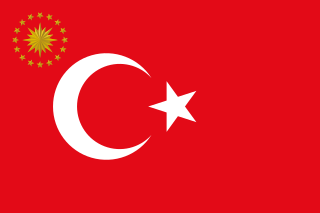
The President of the Republic of Turkey is the head of state and head of government of the Republic of Turkey. Following the 2018 general election, the incumbent office-holder assumed the role of an Executive President and holds both ceremonial and executive status. In this capacity, the President represents the Republic of Turkey, and the unity of the Turkish nation, as well as ensuring the implementation of the Constitution of Turkey and the organized and harmonious functioning of the organs of state. The articles from 101 to 106 of the Constitution establish all the requirements, election, duties, and responsibilities for the office of the President. The office of the President of Turkey was established with the proclamation of the Republic of Turkey on 29 October 1923. The President of Turkey is often referred to as the Cumhurbaşkanı, meaning 'President of the People'.
A decree is a rule of law usually issued by a head of state, according to certain procedures. It has the force of law. The particular term used for this concept may vary from country to country. The executive orders made by the President of the United States, for example, are decrees. In non-legal English usage, however, the term refers to any authoritarian decision. Documents or archives in the format of royal decrees or farming were issued by rulers.

The President of Georgia is the constitutional Head of State of Georgia as well as the Supreme Commander-in-Chief of the Defense Forces. They represent Georgia in foreign relations. The constitution defines the presidential office as "the guarantor of the country’s unity and national independence."
The Council of Ministers of Bosnia and Herzegovina, often called Bosnian Government is the executive branch of the government of Bosnia and Herzegovina. It is also called the Cabinet.

The Council of Ministers is the main collective decision-making body of the Government of Spain, composed of the Prime Minister and 17 ministers. According to the Constitution, junior ministers like the Secretaries of State could be part of the Council if the Government Act included them, a constitutional provision that until today has not been used. The Monarch may also chair the Council when needed on the invitation of the Prime Minister.
The Constitution of Iraq is the fundamental law of Iraq. The first constitution came into force in 1925. The current constitution was drafted and approved in 2005.

The judicial system of Turkey is defined by Articles 138 to 160 of the 1982 Constitution. Civilian and military jurisdiction are separated. While military courts usually only try military personnel, they can also try civilians in times of martial law and in matters concerning military service.

The London and Zürich Agreements for the constitution of Cyprus started with an agreement on the 19 February 1959 in Lancaster House in London, between Turkey, Greece, the United Kingdom and Cypriot community leaders. On that basis, a constitution was drafted and agreed together with two further Treaties of Alliance and Guarantee in Zürich on 11 February 1959.

The Constitution of Armenia was adopted by a nationwide Armenian referendum on July 5, 1995. This constitution established Armenia as a democratic, sovereign, social, and constitutional state. Yerevan is defined as the state's capital. Power is vested in its citizens, who exercise it directly through the election of government representatives. Decisions related to changes in constitutional status or to an alteration of borders are subject to a vote of the citizens of Armenia exercised in a referendum. There are 117 articles in the 1995 constitution. On November 27, 2005, a nationwide constitutional referendum was held and an amended constitution was adopted. The constitution was amended again in a national referendum on December 6, 2015 that changed the political structure from a semi-presidential system to a parliamentary republic.
The federal government of Iraq is defined under the current Constitution, approved in 2005, as an Islamic, democratic, federal parliamentary republic. The federal government is composed of the executive, legislative, and judicial branches, as well as numerous independent commissions.
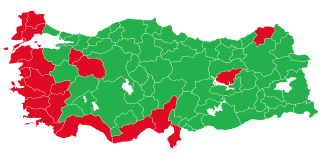
A constitutional referendum on a number of changes to the constitution was held in Turkey on 12 September 2010. The results showed the majority supported the constitutional amendments, with 58% in favour and 42% against. The changes were aimed at bringing the constitution into compliance with European Union standards. Supporters of Turkish EU membership hope constitutional reform will facilitate the membership process.

The Constitution of the Republic of Turkey, also known as the Constitution of 1982, is Turkey's fundamental law. It establishes the organization of the government and sets out the principles and rules of the state's conduct along with its responsibilities in regards to its citizens. The constitution also establishes the rights and responsibilities of the latter while setting the guidelines for the delegation and exercise of sovereignty that belongs to the Turkish people.

The Supreme Electoral Council is the highest electoral authority in Turkey. It was established by the Deputies Election Law no. 5545 on 16 February 1950. After the 1960 coup, the Supreme Electoral Council gained constitutional authority by the Constitution of 1961. Its duty is to ensure that the principles and rules of the constitution are upheld.
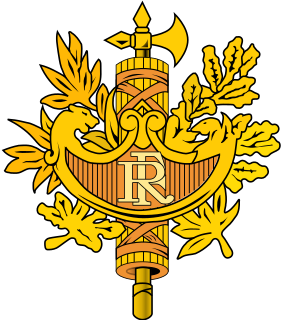
The politics of France take place with the framework of a semi-presidential system determined by the French Constitution of the French Fifth Republic. The nation declares itself to be an "indivisible, secular, democratic, and social Republic". The constitution provides for a separation of powers and proclaims France's "attachment to the Rights of Man and the principles of national sovereignty as defined by the Declaration of 1789."
The Council of Judges and Prosecutors, HSK; previously named as Supreme Board of Judges and Prosecutors is the disciplinary body of the legal system of the Republic of Turkey. It was established under the 1982 Constitution of Turkey and significantly amended by the Turkish constitutional referendum, 2010. After 2017 constitutional referendum, members are reduced to 13.
State Inspection Council was founded based on the 1982 constitution as a central assisting body. The main function of the council is to audit governance in terms of compliance with legal regulations, in coordination with high efficiency. The council is under direct authority of the President of the Republic of Turkey.

The Council of Ministers is the executive branch of the government of the unrecognized state Northern Cyprus, consisting of ministers. The council is chaired by the Prime Minister of Northern Cyprus and the ministers head executive departments of the government. The President of Northern Cyprus reserved the right to chair the Council of Ministers, albeit without voting. The maximum number of ministries, as defined by the constitution, is ten.

The Council of Ministers of Lebanon is the executive body of the Republic of Lebanon. Its president is the Prime Minister of Lebanon, and it appointed by the President of Lebanon with confirmation of the Parliament of Lebanon. It is generally equally composed of Muslims and Christians. The Council of Ministers is considered to be the "government" of Lebanon by the Constitution.

